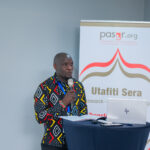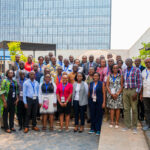By Jim Kaketch, Martin Atela and Tim Brewer
Background
During the UN Water Conference 2023 (March 22-24, 2023), the UN headquarters in New York was abuzz with delegates from all over the world to mark the UN water week 2023. The event was a midterm review of the UN General Assembly’s Water Action Decade 2018 – 2028, a programme of action launched at the First High-level International Conference held in Dushanbe on 20-21 June 2018. Through the programme, the international community set out to achieve three goals: advance sustainable development, energise existing programmes and projects, and inspire action to achieve the 2030 Agenda. Five years later, the UN convened the international community to review progress towards the three goals. Guided by three principles – inclusive, action-oriented and cross-sectoral, the conference was the first for the UN on water issues in almost 5 decades.
A global H2O Crisis
The event comes when the world is only just arising from the COVID-19 pandemic and is faced with the growing devastating threats from climate change, which may double the numbers facing severe water stress by 2050. The world is facing a water crisis in which one in four people are without access to a safely managed water service, and one in three are without access to safely managed sanitation services. In Africa, 1 in 3 countries faces water scarcity. Thus through the UN water week, the UN General Assembly and member signatories to the water action decade recommitted to the UN Resolution 64/292. The resolution recognised access to clean water and sanitation as the human right, essential to realising all other human rights. It’s also a time to remind the global community about sustainable development goal 6 (SDG6) – ensure the availability and sustainable management of water and sanitation for all and to call their attention and concerted action to ensure water and sanitation issues get to the global political agenda.
Global attention is insufficient – more must be done to realise SGD 6
However, global attention is insufficient to ensure the realisation of SDG 6 – water and sanitation for all by 2030, as shown by a recent global review of the evidence by a team of researchers under the Accountability for Water Research and Action programme. The researchers highlighted gaps in how water is governed and identified governance challenges and weak accountability in the sector as threatening the realisation of SDG 6. The review reconfirms the UNDP finding from 2006 that the root cause of the water crisis is poor governance rather than absolute scarcity or an absence of technological or other solutions. The evidence from the review further suggests that accountability and advocacy interventions could bring about positive changes across a range of important outcomes for improved water governance and services. Such changes may include: improved operations and maintenance, monitoring and reporting, access to data and information, representation and inclusion, and political recognition and will.
Accountability for Water (AfW) Research and Outreach Programme’s Side Event
Using this evidence and programme experience in Ethiopia, Tanzania, Kenya, Zimbabwe, Zambia and Liberia, the consortium, including the Partnership for African Social and Governance Research (PASGR), Water Witness International, Water Witness Ethiopia, Shahidi wa Maji, and Kenya Water and Sanitation Civil Society Network, with support from the Water Integrity Network (WIN), Simavi and EWP, convened a side event titled ‘Where Is the Accountability’ at the UN-Water Week in New York. The event was driven by the fact that accelerating the implementation of the objectives of the Water Action Decade depends on building, funding and refining accountability systems that promote continuous and systemic improvement toward accelerated progress on WASH access.
The side event brought together key stakeholders from the development community, including the World Bank, government officials from Kenya and Ethiopia, the private sector and civil society in the WASH sector. The purpose was to:
- Demonstrate the importance of accountability to accelerate SDG6 progress and the human rights to water and sanitation;
- Share strategies for enhancing accountability in the WASH sector;
- Show-up accountability commitments;
- Showcase the opportunities to fund accountability work at different levels for different types of funds, including development partners, financiers, and governments;
- Call for recognition of the fundamental role of an accountability framework for the commitments made by member states.
During the event, the consortium presented findings from the programme. Highlights from the quantitative research in programme countries were as follows:
- Limited awareness among citizens on accountability in the WASH sector hinders active and meaningful citizen participation in the sectors’ governance and reforms.
- Poor coordination and unclear clear roles among government institutions limit stakeholder partner support and efforts, and
- Poor-quality data hinders targeted interventions.
In Ethiopia’s case, for instance, poor coordination and unclear roles at the national level undermine government efforts to enhance accountability for better water sector performance and delivery. Poor coordination is also a potential avenue for perpetuating corruption. On the place of robust data, the World Bank highlighted its efforts in supporting countries by providing actionable data and technical support to ensure accountability mechanisms are streamlined within the WASH sector. However, the Bank does not make loans conditional on clarity of accountability structures in the sector.
Equitable, inclusive approaches critical to urgent water-sector reforms
Including citizen voices (inclusive participation) in the policy dialogue to enhance accountability in the sector was highlighted as crucial to sustaining fundamental reforms in the sector. In particular, centring accountability practices and reforms around the needs and views of the marginalised and low-income communities could ensure better outcomes. For example, the evidence generated by KEWASNET and PASGR partners in the consortium, shows that lack of access to clean water and poor service delivery of basic sanitation services has given rise to a form of gender-based violence known as sextortion, exposing women and young girls to the risk of sexual violence. In some Nairobi slums, for instance, male staff from the utilities take advantage of poor girls threatening to shut off the water supply if sexual advances are not accepted.
These experiences have a far-reaching impact on the reality that many women and girls experience trying to access water for themselves and their families, yet this is a form of corruption in the water sector that often escapes policymakers’ attention. Yet, no policy document recognises sextortion (a form of sexual exploitation and corruption that occurs when people in the position of authority seek to extort sexual favours in exchange for something within their power to grant or withhold) as a form of corruption.
Conclusion and the way forward
The evidence is clear that funding for civil society to participate actively in formal and informal accountability mechanisms is essential for improving services and limiting corruption. Even the best governance and oversight mechanisms, when working well and adequately resourced, depend on citizens’ input in the form of complaints, campaigns and feedback to identify and rectify problems. But while government accountability structures can and should, be funded from the three T’s of tariffs, taxes and transfers, social accountability has no such resource. If accountability is a two-way street, only the government side is paved. Recognising that big donors may not be willing to support small-scale of social accountability, and the long-term engagement of civil society support, the consortium called for foundations and development partners to fund an accountability facility to take on this role. The SDG6 Accountability Facility would provide financial support and expertise to civil society accountability, co-creating contextually effective interventions to accelerate progress.

The consortium joined other representatives of global civil society, water users, water management and the research community on water, sanitation and hygiene to draft and sign an open letter of concern to the UN Secretary-General calling for greater accountability, rigour and ambition in the outcomes of UN-Water 2023. The focus must shift to co-creation and co-production with stakeholders, including development partners, the private sector, policymakers, think tanks, researchers, civil societies and policy consumers (communities). An equitable process that surfaces citizen knowledge and locally generated evidence and solutions should lead to inclusive action and trigger change by tackling power imbalances in the water sector. Ultimately, it should steer partners to be accountable and deliver national and international commitments for achieving SDG6.




